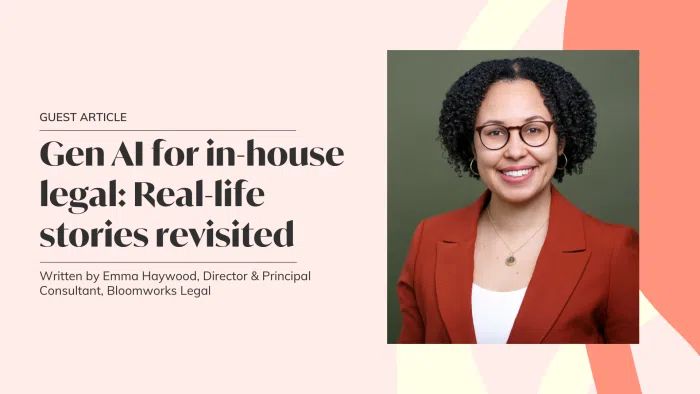Last year, acknowledging the rapid expansion and diverse applications of AI-generated writing tools, we got in touch with in-house lawyers in our community to understand their integration of programmes like ChatGPT into their workflows.
One such conversation was with Emma Haywood, Director and Principal Consultant at Bloomworks Legal, who shared her insights, ChatGPT use cases, and guidance for those exploring AI tools.
A year later, we revisited Emma to explore the continued
relevance of generative AI in her work, the evolution of her AI
utilisation, and her recommendations for others considering the
adoption of AI in their tasks.
Written by Emma Haywood, Director and Principal Consultant
at Bloomworks Legal

How has your use of AI evolved over the past year? Have there been any significant changes or advancements in the way you utilise AI tools?
I've spent a lot of time over the past year deepening my understanding of how AI works and exploring appropriate use cases in legal and in my clients' businesses.
As a specialist tech lawyer, my main interest is AI governance: how can my clients build and deploy AI responsibly? How can they structure their business operations to ensure they get the best out of AI while also minimising the risks and harms it brings? My own use of AI is always informed by that perspective.
I follow new developments closely and attend as many product demos as I can to understand how the market is evolving for legal and non-legal AI tools, but I'm very selective when it comes to incorporating AI into my own practice. I'm glad that we seem to have moved beyond the initial hype and people have a more realistic view of what AI has to offer.
Can you share specific examples or success stories where AI made a notable difference?
I'm always inspired and excited by how my clients are using AI outside of the legal sphere. I support a range of businesses, from publishing houses to specialist cultural consultancies to healthcare companies. I've seen AI used to improve access to health information and educational content, free up time for clinicians to focus on patient-facing work, and support drug discovery and academic research. One interesting project I worked on involved using an expert system (essentially AI that mimics the decision-making process of a human expert) to create a symptom checker to complement – but not replace – a doctor's clinical judgement.
We still have a lot to learn in legal when it comes to impactful use of AI. In my experience, there are real-life use cases for in-house legal, but they're not necessarily groundbreaking (for example, allowing the business to self-serve more effectively by using LLMs to answer questions about company policies, or speeding up due diligence by reviewing and summarising contracts).
Are there any misconceptions you had about AI a year ago that have changed?
Like many, I initially focused on AI as a way of speeding up or automating low-value work, but I've now moved on to thinking critically about whether it might be better to eliminate that work altogether. Do we really need yet another meeting summary that nobody will ever read?
From my perspective, using AI responsibly includes getting the best out of its capabilities, which will often mean using AI to complete appropriate elements of higher impact work. Those who want to use AI effectively don't need deep technical knowledge or skills; it's much more about breaking down the overall objective into sub-tasks and understanding which need a human eye and which are suitable for AI.
In my own practice, this means I'd never use AI to draft a full contract, but I might use it to prepare drafting notes or suggest ideas for additional clauses or risk factors I might not have considered. You also won't find me inviting an AI notetaker to a Zoom meeting any time soon!
What are your next steps or future plans for AI integration in your legal practice?
I'm a sole practitioner and many standalone AI tools aren't especially geared up for micro businesses like mine – they're targeting large enterprise subscriptions.
Instead, I'm turning my attention to AI capabilities in the platforms I already use (for example, my accounting software, legal research tools and productivity suite). While this probably won't lead to any trailblazing discoveries, a well-considered AI tool is of more use to me if it's integrated into a platform I already use to solve an existing problem.
Based on your experiences over the past year, what advice would you give to other in-house lawyers considering or currently using AI?
My general advice from last year still stands: always start with the problem you want to solve, rather than trying to shoehorn a new tool into your tech stack for the sake of it. This is true for legal and non-legal use cases.
I'd also emphasise the importance of AI governance. For a legal team, this means putting in place procedures that will help you to understand how AI is being used within your team and your wider organisation, while also navigating the legal, regulatory and ethical challenges it brings. AI governance doesn't have to be complex or a blocker to innovation. Start with a basic fact-finding mission and an internal policy setting out some key principles on how to use AI safely.
Most organisations are still buying rather than building AI and many jurisdictions around the world have an eye on AI regulation. In-house lawyers have the perfect opportunity to set the tone by supporting on governance, procurement and compliance issues.
The content of this article is intended to provide a general guide to the subject matter. Specialist advice should be sought about your specific circumstances.


